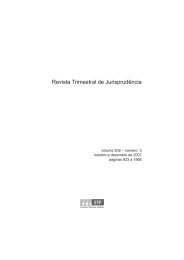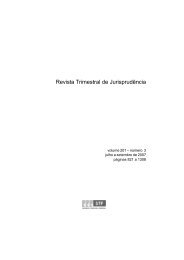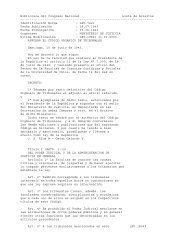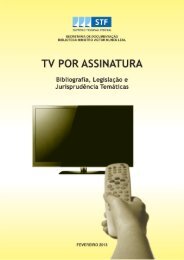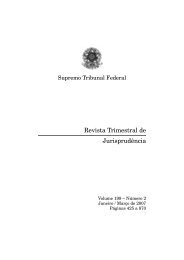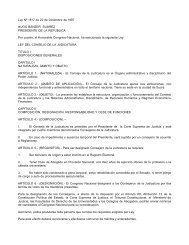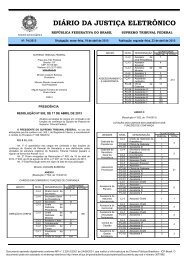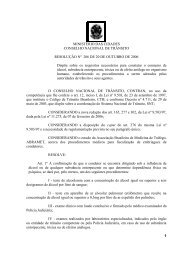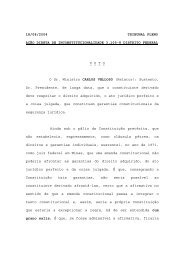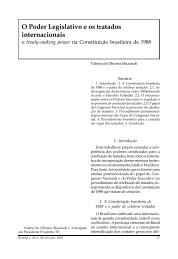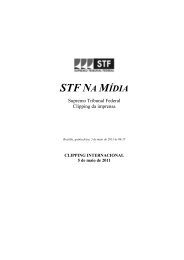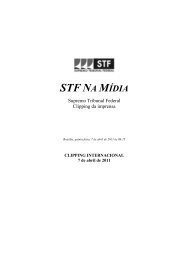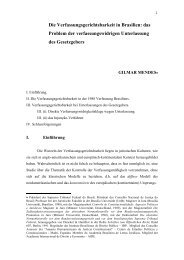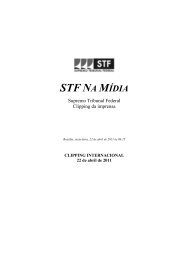STF NA MÍDIA
STF NA MÍDIA
STF NA MÍDIA
You also want an ePaper? Increase the reach of your titles
YUMPU automatically turns print PDFs into web optimized ePapers that Google loves.
JUSTIÇA NO EXTERIOR •<br />
THE GUARDIAN (LO) • COMMENT IS FREE • 20/9/2011<br />
Despite China s growth, its workers endure a fundamental evil<br />
Migrants who toil in the cities still face a decades-old system of segregation and exploitation.<br />
But many are now demanding fairness<br />
Hsiao-Hung Pai<br />
When I walk into Beijing s<br />
migrant worker slums, five<br />
minutes from the high-rising<br />
financial centre and shopping<br />
malls, I understand what Ai<br />
Weiwei means when he calls<br />
Beijing "a city of violence" –<br />
violence against a large section<br />
of its working population<br />
and their families. "We<br />
live under the same sky, why<br />
are we not entitled to the<br />
same rights?" is a question<br />
many ask in Xinzhuang and<br />
other migrant neighbourhoods.<br />
During the past month schools<br />
for children of migrant<br />
workers – who build the capital<br />
s offices and mansions,<br />
clean its streets and guard its<br />
security – have been shut<br />
down, with more to follow in<br />
the coming weeks. Tens of<br />
thousands of migrant children<br />
are left without schools<br />
and nurseries to go to. Here<br />
in Beijing, two worlds exist<br />
in parallel. Those of rural<br />
origin – a third of the city s<br />
19 million population – are<br />
ruthlessly segregated from<br />
the urban dwellers, economically,<br />
socially and culturally.<br />
Despite the attempt to pretend<br />
this is a local issue and<br />
only local governments are<br />
responsible, the day-to-day<br />
injustices experienced by<br />
migrants are very much a<br />
result of central policies.<br />
The system that has maintained<br />
the rural-urban segregation<br />
within China s cities is<br />
hukou (household registration),<br />
set up in 1958 to control<br />
rural-to-urban migration.<br />
While rhetorically the peasantry<br />
was the "vanguard of<br />
the revolution" – and indeed<br />
the 1949 revolution wouldn t<br />
have been possible without<br />
them – in practice, in China s<br />
post-1949 drive to industrialisation,<br />
the peasantry became<br />
an unchangeable category<br />
of social class in the Maoist<br />
theory of the "four blocs of<br />
society" known as "new democracy"<br />
(xinminzhu zhuyi).<br />
Peasants role was to produce<br />
and feed the cities and support<br />
the modernisation process<br />
of their motherland.<br />
Peasants class status was<br />
fixed – as shown on their ID<br />
– no matter what they might<br />
choose to do. "Wo shi nongmin<br />
[I am a peasant]," I ve<br />
had migrant workers tell me<br />
about their class origin, as if<br />
it were a stamp on your body<br />
for life. It was impossible for<br />
peasants to move their hukou<br />
to the cities.<br />
This class status hasn t changed<br />
since Deng Xiao Ping s<br />
gaige kaifang (economic<br />
reforms and opening up), in<br />
the late 1970s. The countryside<br />
underwent decollectivisation<br />
while it remained<br />
the nation s production<br />
backyard. Agricultural<br />
production increased in the<br />
early stage of the reforms in<br />
"releasing the productive<br />
forces", as Deng called it, but<br />
with rampant corruption and<br />
heavy taxation, the poverty<br />
deepened. Since the mid-<br />
1980s half of the 400 million<br />
rural working population<br />
have been pushed off the<br />
land, seeking a livelihood<br />
away from their villages.<br />
As rural residents came to<br />
the cities, they immediately<br />
faced discrimination and<br />
exclusion. Migrant workers<br />
first welcome was being told<br />
to stand in the min-gong (peasant<br />
worker) queue inside<br />
train stations. And there was<br />
no way to disguise class origin:<br />
the migrants could be<br />
distinguished by their brown,<br />
tanned faces and bent backs<br />
(due to years of farm work).<br />
They spoke their own dialects<br />
instead of "proper"<br />
Mandarin. Many faced verbal<br />
abuse as soon as they arrived.<br />
In the three decades of gaige<br />
kaifang, numerous barriers<br />
have been set up to discourage<br />
their migration: the strict<br />
requirement for the unaffordable<br />
temporary residency<br />
permit, and the random street<br />
search by police. Most migrants<br />
feel they are a hidden<br />
army of labour that supplies<br />
industries and urban life with<br />
S T F N A M Í D I A • 2 2 d e s e t e m b r o d e 2 0 1 1 . . . . . . . . . . . . . . . . . . . P Á G I N A 2 4 1



